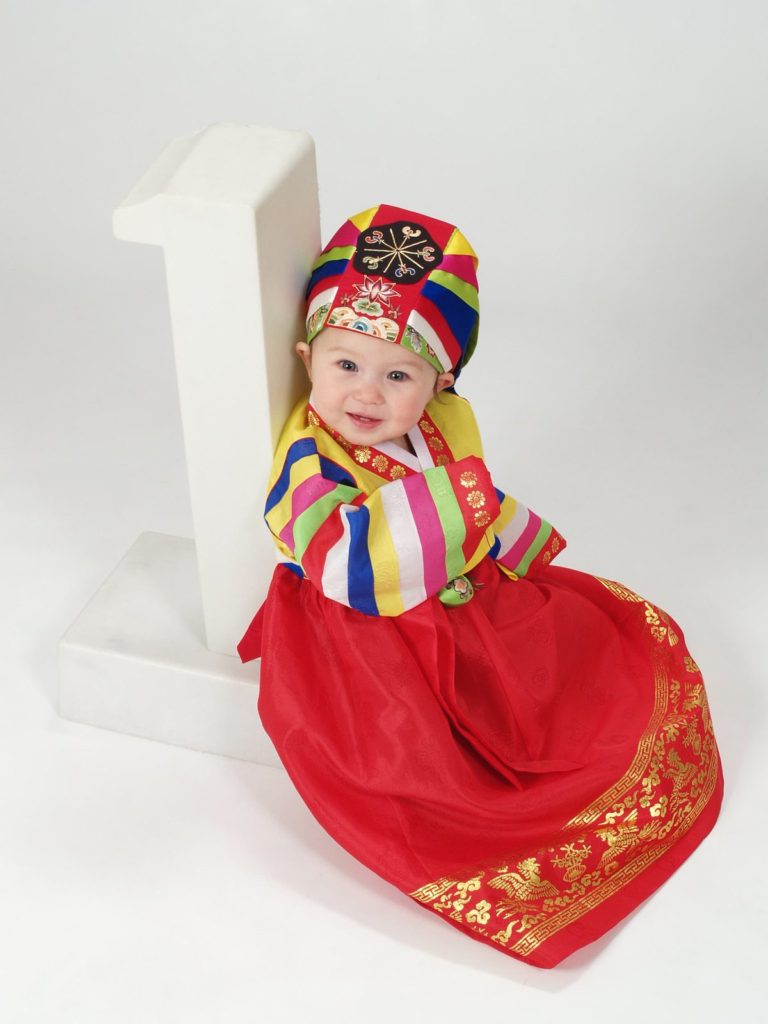There is a blue vinyl sign that circulates in our Korean church circle. Whenever one of the church babies turns one, someone rents this sign for picture-taking purposes. It says: “Congratulation. First Birthday Party.”
This poster, with its minor misspelling, brought me comfort every time it was circulated.
This wasn’t my usual tenor, and I realized my resentment writ large toward my husband’s culture was becoming more and more pronounced.
I was, at times, the only non-Korean member of a small Korean congregation in Massachusetts. I had attended the church with my Korean American boyfriend for years. But when we got married, the church elders took a keen interest in me, always asking me if I was pregnant when I wasn’t, if I cooked Korean food for my husband when I’m not Korean, when was I going to stop working when I had no intention of doing so, and when was I going to have a son when I obviously had no control over the outcome. These little pecks and nudges came in small waves, regularly and predictably when I was out of my husband’s earshot. When I reported to him what I’d been asked or told, I would find myself clenching my jaw, my tone becoming embittered. This wasn’t my usual tenor, and I realized my resentment writ large toward my husband’s culture was becoming more and more pronounced.
But after my daughter’s first birthday, this mental tug-of-war ceased. I let go of the rope.
Korean culture celebrates the first 100 days of a baby’s life, as well as the first birthday. These are practically holy days of obligation. Hardly ever do they pass unacknowledged. Babies didn’t live to be 100 days old in wartime Korea or in the years that soon followed. There was not enough food or blankets or medicine; many women died in childbirth.
For this reason, celebrations of children’s milestones have one foot in the present moment and one in a checkered past of oppression, poverty, and South Korea’s fight to emerge from its wartorn history.
A thankful heart has a very hard time sharing space with a spiteful heart.
My first Mother’s Day fell on the same weekend that we celebrated our daughter’s 100th Day. As we sat on the back patio of a neighborhood cafe, I enjoyed a moment in which my husband, John, was reading the newspaper, our daughter was sitting placidly in her stroller, I was sipping jasmine tea, and the sun was casting a big warm net around us. I thought how thankful I had been for these 100 days of motherhood and for all the medical advances and legislation and social progress that had made it possible for me to survive an emergency C-section, recover, and nurse a thriving baby.
A thankful heart has a very hard time sharing space with a spiteful heart. In time, my gratitude crowded out the resentment that I was holding toward my Korean elders. I realized that their interest in me, however awkward or aggressive, was born of a sincere love for my little family. These elders went out of their way to make me feel noticed, therefore trying to make me feel a part of a family.

I have also had to reckon with my own discomfort. It wasn’t just the discomfort of being the lone white lady in a majority-minority social circle; I also had to face the difficult truth that I was not conditioned for this discomfort, because it was a muscle I had not had to build until adulthood. For most of my life, I had orbited in white spaces where I rarely felt out of place. I had not needed a translator for either the language or the culture. Becoming the mother of a mixed-race child cracked me wide open to the homogeneity in my life I hadn’t questioned. My child did not need a mother who avoided discomfort—she needed one who would embrace it and use it as a teacher.
During the first year of our daughter’s life, I watched as the “Congratulation” banner was hoisted again and again. Invariably, a church elder would ask me if I wanted to borrow it for our daughter’s big day. They asked me without scruples if I was going to try to outdo so-and-so’s birthday party efforts, and was I aware that First Birthday Parties were a Very Large Deal in Korean culture?
We ended up not using the banner, but we celebrated our daughter’s first birthday in style at her grandparents’ home in Michigan with ceremonial rice cakes, silken Korean hanbok gowns, and a million photographs to boot. My parents and siblings were there to celebrate and hold a one-year-old in her silken finest.
My child did not need a mother who avoided discomfort—she needed one who would embrace it and use it as a teacher.
We upheld the custom of the one-year-old “choosing” her career, too. Korean parents will typically place an array of suggestive implements like a stethoscope, a dollar bill, and even a Bible in front of the birthday boy or girl and wait with breathless anticipation for the child to “announce,” by way of reaching for a singular object, his or her future ambitions. Our girl reached for a bottle of prescription meds. Perhaps she will be a psychotherapist like her daddy. Or perhaps she will be driven to be a pill-popper.
Either way, a loud congratulation resounded for her unabashed choice, and I was filled with only gratitude.
Like this piece? Subscribe to our newsletter for real stories about women on their journey to motherhood.
